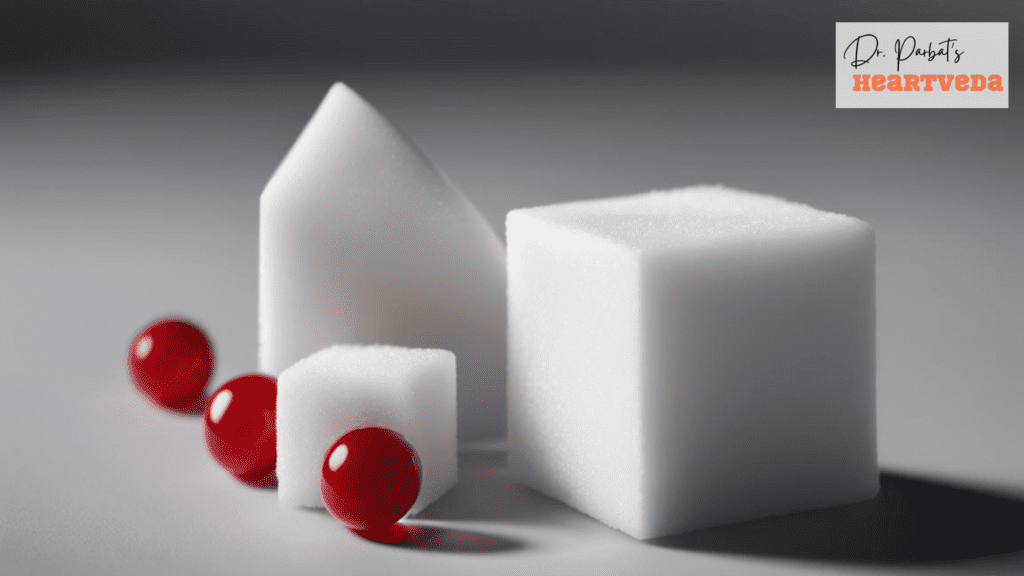
Welcome to an eye-opening exploration of the relationship between sugar and cholesterol levels. In this article, we will uncover the effects of sugar on your cholesterol and shed light on whether sugar is responsible for cholesterol-related issues. The truth may surprise you and prompt you to reassess your sugar consumption for the sake of your health.
The Link Between Sugar Consumption and Cholesterol Levels
When it comes to cholesterol levels, consuming sugar and other carbohydrates can have a negative impact. High sugar intake has been linked to an increase in triglycerides and a decrease in HDL, which is often referred to as “good cholesterol.” Additionally, sugar consumption can lead to changes in LDL molecules, the “bad cholesterol,” causing arteries to clog more rapidly and increasing the risk of thrombosis. It is important to note that even if LDL levels appear to be within the normal range, the presence of dysfunctional LDL can still have detrimental effects on cardiovascular health.
Reducing sugar consumption and making healthier food choices can play a vital role in managing cholesterol levels. By incorporating a balanced diet and lowering daily sugar and carbohydrate intake, individuals can positively impact their cholesterol levels, improve their heart health, and overall well-being.
By understanding the correlation between sugar consumption and cholesterol levels, you can take control of your health and make informed choices about your diet. Stay tuned for the next section, where you will discover the benefits of reducing sugar intake and its role in cholesterol formation.
The Benefits of Reducing Sugar Intake
Lowering your daily sugar intake and reducing carbohydrate consumption can have significant benefits for cholesterol management. Research has shown that sugar plays a role in cholesterol formation and can lead to a sugar-induced increase in cholesterol levels. By understanding the connection between sugar and cholesterol, you can take steps to improve your heart health and overall well-being.
One important way to cut down on sugar is to avoid high fructose corn syrup. Unlike regular table sugar, the brain does not sense high fructose corn syrup, which can lead to increased food intake and contribute to unhealthy cholesterol levels.
Reducing your sugar and carbohydrate intake can have noticeable effects in just a few days. Many individuals report increased energy levels, reduced stress, and a desire for healthier food choices. By making conscious choices to reduce your sugar consumption, you can positively impact your cholesterol levels, heart health, and overall well-being.
Here are some practical tips for reducing your sugar intake:
- Read food labels carefully and watch out for hidden sugars in processed foods.
- Choose whole foods such as fruits, vegetables, and lean proteins, which are naturally low in sugar.
- Limit your consumption of sugary beverages like soda, juice, and energy drinks.
- Replace sugary snacks with healthier options such as nuts, seeds, or Greek yogurt.
- Gradually reduce the amount of sugar you add to your coffee, tea, and other beverages.
- Experiment with natural sugar substitutes like stevia or monk fruit.
By implementing these strategies, you can take control of your sugar intake and reduce the negative impact it has on your cholesterol levels. Remember, small changes can make a big difference in your health and well-being.
The Role of Diet in Cholesterol Management
In addition to reducing sugar intake, it’s important to adopt a cholesterol-friendly diet. This means focusing on heart-healthy fats, lean proteins, and high-fiber foods. Incorporating more fruits, vegetables, whole grains, and legumes into your meals can help lower cholesterol levels and improve overall heart health.
Here is an example of a cholesterol-friendly meal plan:
| Meal | Food |
|---|---|
| Breakfast | Steel-cut oatmeal with berries and a sprinkle of chopped nuts |
| Lunch | Grilled chicken breast with a side of mixed greens and quinoa |
| Snack | Carrot sticks with hummus |
| Dinner | Baked salmon with roasted vegetables and brown rice |
| Snack | Apple slices with natural almond butter |
Incorporating more cholesterol-friendly foods into your diet, along with reducing sugar intake, can have a positive impact on your cholesterol levels and overall cardiovascular health.
The Sugar Industry’s Influence on Cholesterol Research
Newly discovered industry documents have shed light on the collaboration between the sugar industry and nutrition scientists in the 1960s. This partnership aimed to shift the blame for heart disease from sugar to fat and cholesterol, diverting attention away from the detrimental effects of sugar consumption on cholesterol levels.
The sugar industry recognized that promoting low-fat diets would inadvertently increase the consumption of sucrose, their primary product. To protect their economic interests, they downplayed the evidence linking sugar consumption to high blood cholesterol and triglyceride levels, as well as other related health risks.
One of the tactics used was funding a literature review that emphasized the role of saturated fat and cholesterol in heart disease while ignoring the limitations of studies on dietary fats. By manipulating scientific research, the sugar industry successfully influenced the public opinion and scientific understanding of the relationship between sugar and cholesterol.
This influence has had far-reaching effects, shaping dietary recommendations and public health policies for decades. The focus on reducing fat intake overshadowed the importance of limiting sugar consumption, leading to an increase in sugar-related health issues, including elevated cholesterol levels and an increased risk of heart disease.

The revelations from these industry documents underline the need for further research and unbiased analysis of the sugar and cholesterol relationship. It is crucial to acknowledge the impact that the sugar industry’s influence has had on the understanding of dietary risk factors for heart disease. By uncovering the truth about sugar’s role in cholesterol formation, we can take steps towards promoting healthier dietary choices and mitigating the risks associated with excessive sugar consumption.
Conclusion
The relationship between sugar consumption and cholesterol levels is complex. Excess sugar and carbohydrate intake can have negative effects on cholesterol, leading to raised triglycerides and lowered HDL (good cholesterol) levels. This can contribute to an increased risk of heart disease.
However, it’s important to note that the sugar industry’s influence on cholesterol research has impacted public opinion and the scientific community’s understanding of dietary risk factors for heart disease. Recognizing the role of sugar in cholesterol formation is crucial for promoting overall health.
By making conscious choices to reduce sugar consumption and carbohydrates from sources like table sugar (sucrose) or high-fructose corn syrup, individuals can positively impact their cholesterol levels and reduce their risk of heart disease. So, be mindful of hidden sugars in processed foods and consider opting for healthier alternatives to maintain a balanced and heart-healthy lifestyle.
Key Takeaways:
- Sugar, particularly in the form of table sugar or high-fructose corn syrup, can contribute to cholesterol problems.
- Consuming excess sugar and carbohydrates may raise triglycerides and lower HDL (good cholesterol).
- Avoid hidden sugars in processed foods and be mindful of your carbohydrate intake.
- Reducing sugar and carbohydrate consumption can positively impact your cholesterol levels and overall well-being.
- The sugar industry’s influence on cholesterol research has affected public opinion and understanding of dietary risk factors for heart disease.
